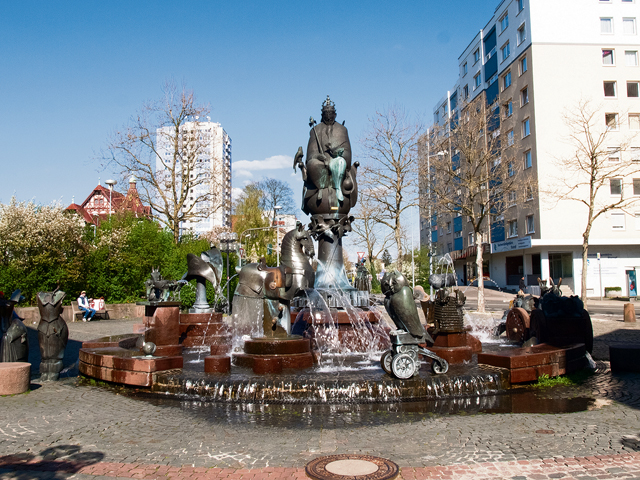
Have you ever driven down Barbarossa Strasse, looking for the Barbarossaburg? Maybe while doing so, you’ve stopped at a Barbarossa Bakery to get a few Barbarossa bread rolls. And maybe you’ve wondered ‘What is a Barbarossa and why is this city so obsessed with it?”
Friedrich I, was the first “Emperor of the German Holy Roman Empire” and from the royal Staufer family. He was born in Hagenau, France in mid-December 1122 and was crowned as emperor in 1152. He resided in Kaiserslautern off and on from 1171 to 1187, where he erected a Kaiserpfalz (an imperial palace) and enjoyed fishing in one of the many ponds surrounding the city. The palace was located just below the City Hall in Kaiserslautern and parts of it have been excavated to view, while a fish also plays a significant role in the city.
The emperor was quite an adventurous character and well-traveled for his times. One of his favorite pastimes was building palaces wherever he set foot. His nickname Barbarossa means “red beard” in Italian and he ruled over an area encompassing most of modern-day Germany, Czechia, Austria, Switzerland, Luxemburg, Belgium, the Netherlands, Italy and parts of France and Poland.
He had a Kaiserpfalz built near Düsseldorf, which is now called Kaiserswerth, to charge toll from ships along the Rhein River. In the year 1189 he declared the City of Hamburg as a custom-free zone, which resulted in prestige and prosperity for the city. Hamburgers are celebrating their 834th Port Anniversary this year.
In addition, there is a legend about him sleeping in a cave in the Kyffhäuser Mountains in Thüringen, only to awaken to save the nation. A gigantic statue depicts him resting in an armchair waiting for this special moment.
It is therefore no surprise that he was considered one of the mightiest people in the 12th century. His rule is generally considered one of prosperity, economic growth, and increased scholarship but also one of war and conflict. The pride of being one of the favorite cities of such an important historical figure can even be seen in the name of the city – Kaiser is the German word for “emperor” while Lauter probably comes from an old Latin expression (lutra) for “clear water”. So the city is essentially called “the emperor’s clear spring”.
As a 70-year-old he set out on his third crusade, but never made it to Jerusalem. He didn’t heroically die in battle, but allegedly drowned in Saleph River, now near Göksu/Silifke in Turkiye, while taking a bath and his human remains are said to be buried in Jerusalem.
Maybe that’s the reason why Kaiserslautern has yet to name a river after him…







